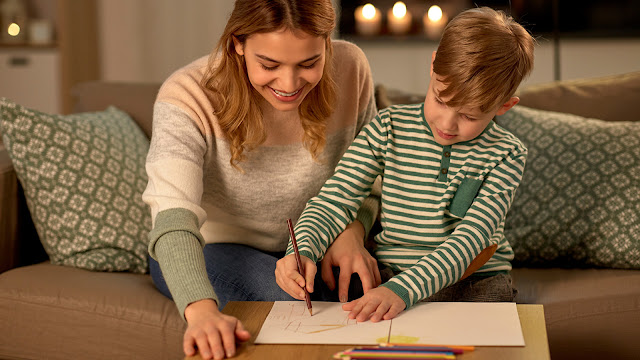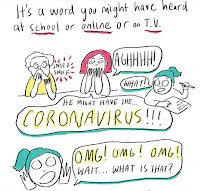Learn Without Driving Yourself Crazy, According to Experts?

Friday, March 20, the coronavirus pandemic caused the
closure of 45 schools by 45 states, according to Education Week. Students from
at least 114,000 public and private schools across the United States do not
attend classes as usual - and their parents and other guardians do not know
what to do with them.
Many school districts are scrambling to get their courses
online so students can continue their education without interruption. According
to USA Today, some areas are better than others in this area because
"districts and states vary enormously in their ability to provide
educational services at a time of social isolation."
Schools and teachers are doing everything they can (and we
thank you very much!). Despite this, this week, more responsibility for bringing
up children has fallen on parents, many of whom feel compelled to become
quasi-students at home, whether they like it or not.
Whether you are a parent whose job allows you to work
remotely, or are completely out of work and have to take care of your child,
the coronavirus probably disrupts your routine and leaves you with a young researcher
to monitor and guide. Some kids would undoubtedly be more than happy to spend
the whole day playing video games and watching TikTok dance challenges, and
there is something to say to allow the kids (and parents) to spoil themselves
given the stressful moments. We have discussed with experts the best ways to
stimulate your children's minds and keep everyone as sane and happy as possible
while schools are closed due to coronavirus.
Talk to Kids About Coronavirus
The first step each parent should take is to talk to
children about why schools are closed and why self-isolation is so important.
It is important to let people know that the situation is serious, without
causing panic. Keep in mind that you never know what incorrect and perhaps
alarmist ideas about COVID-19 your children have learned online or with
friends.
Parents must "explain factually, in age-appropriate
language, what the virus is and how it affects children," says
Florida-based Dr. Richard Horowitz, parent coach and author of Family Centered
Parenting ", he says. "Reassure them that their parents are doing
everything to keep them safe and healthy without exaggerating that everything
is fine."
From there, Dr. Horowitz encourages parents to "control
adult anxiety and adopt safe, but not extreme, safety behaviors." Your
children are likely to be as afraid of all known strangers to the virus as you
are, so regular check-ups should be essential. "Organize frequent family
reunions to allow children to express their fears and to discuss and create
family rules and routines for safe practices."
Home School Tips

In many cases, parents should simply support the efforts of
their child's teachers. "If a child stays connected to public school
during their time at home, the parent need only follow the school plan for
lessons and schoolwork," says Mary Ann Kelley, founder of
TheHomeSchoolMom.com, one of the oldest and most popular homeschooling sites.
If you feel the need to design your own lesson plans, or
just to understand what the kids should be doing every hour, parents may not
know where to start. “Parents tasked with scheduling home schooling may wonder
what a typical home school day looks like. The truth is that it varies from
family to family, and the order in which the work is done is less important than
the environment and the method of implementing the schedule, "says Kelley.
While it is a good idea to have some sort of structure, you
can and should respond to what works best for your family. “Active children can
concentrate better if they are allowed to move during their work. Some children
are more engaged when listening to music through headphones,” she says.
"The optimal home school schedule is one that keeps an individual child
with their unique needs engaged."
Educational Websites
Home students have been participating in this game for a
long time, and there are many educational websites that are great teaching
resources.
"Many for-profit learning companies offer their
resources for free during this time," says Kelley. “We have an
ever-expanding list of over 50 free educational resources that parents can use
around the world. The online resources on the list include everything from a
free download of an eBook made up of tools and ideas to inspire creative play,
to online science lessons for shark live Facebook streaming."
For example, if you've never been the biggest math student
but want your kids to continue learning decimals, Palo Alto-based Happy Numbers
currently offers free online lessons for the rest of the year, which include
immediate comments, so your students will not be outdone.
Your Family’s Mental Health
Although children are very resistant, it is entirely
possible that your child is terrified of the idea of a virus which, frankly,
has already killed thousands of people and may have already had an impact on
someone. one they know. If you think they need mental health help, don't
hesitate to take action. A great resource for families is the Child Mind
Institute, a national non-profit organization, which has an excellent team of
clinical experts and which conducts live Facebook discussions with clinicians.
They have a number of resources for parents, including how to tell your kids
about terrifying news and how to deal with anxiety. In addition, many
therapists and counselors offer sessions via Skype, and Psychology Today has a
search engine to find mental health help in your community, if you or your
family need one-on-one time. with an expert.
Travel The World
So you're stuck at home. But if you try to use your
imagination and the Internet, you can still see the world. Laura Davis of
College Nannies, Sitters and Tutors online service recommends that parents keep
their children's minds stimulated by becoming virtual tourists.
“Even without traveling, you can still learn more about
different countries and cultures. Start on the first day by asking each child
to create their own passport, then discover a new country every day throughout
the week,” she says. "You can watch YouTube videos, check out audio books
from your home library, or even try to cook a recipe from this country."
For example, if you're new to Germany, try making pretzels."
Family Games to Play in Quarantine

There is no better way to promote the family bond while
stimulating your child's mind than to play a game together as a family. Dr. Lee
Scott, chair and member of the educational advisory board for The Goddard
School, early childhood development program, has some tips on what parents
should keep in mind.
As for the puzzles, "Choose the ones that suit your
child's age and try a new one every day. For older children, put a puzzle on
the table and challenge the family to finish it before the end of the day. Give
prizes at dinner (that is, a prize for those who finished the edges, who worked
the longest). "
The board games are great too. "Dust off the ones you
have and start playing. Extend the game by creating your version of the game
and change the rules,” she says. Or think of puzzle games like "I Spy or
Charades." Easily done indoors or outdoors. Try a new version every day.
This allows children to use their imaginations and stimulate brain stimulation."
Scott also recommends that parents "challenge your
children to create a work of art or something useful from the materials
found," she says, like paper tubes and old boxes. "Teach them
ingenuity."
Another project could be to work with your children to
create "a family memory book." Put the smartphone or camera to work.
Have your kids take pictures throughout the day,” she says. "If you have a
printer, you can print them out and paste them into a journal or use apps and
create a slideshow to share at the end of each day after dinner."
When in Doubt
Finally, as much as technology has changed the way children
learn, you can never go wrong by giving your child a book and telling them to
read, just like your parents did (hopefully).
Brett Murphy Hunt teaches in the MBA program at Assumption
College, as well as in the English Department of CPS at Northeastern University
and is the owner of Brett E. Murphy Tutoring & Consulting in Massachusetts.
She says that "as a tutor for kindergarten to grade 12 students and a
college lecturer, the most common problem facing students today is the lack of
attention. As such, this forced period of social distancing presents a rare
moment for students to practice a skill that is sorely lacking: reading. Calm
and simple reading.
Children can benefit from all kinds of reading (news,
graphic novels, magazines on sport or fashion, etc.), but at this moment, the
moment may be particularly favorable for children (and adults) to open a big
Book. "Whether it's from a tablet or a physical book, getting back to
basics and fine-tuning the ability to read something long for a significant
period of time will serve students at university and beyond", she says.
"It may take a little more patience to settle the kids down, but it will
pay dividends for their education."







0 Comments